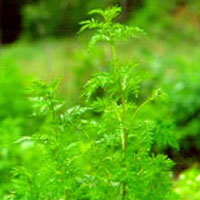Penn Herb Wellness Guide
Sweet Annie
 © Martin Wall
© Martin WallHow It Works
Artemisinin, called qinghaosu in China where it was first discovered, is thought to account for the antimalarial activity of the plant.3, 4 This compound is a sesquiterpene lactone and is believed to cause damage to the organisms that cause malaria inside the red blood cells they infect. Preliminary and double-blind trials, have shown that injections or oral use of artemisinin or similar compounds rapidly and effectively cure people with malaria.5 A human trial has also found that artemisinin reduced mortality due to malaria by 50% compared with treatment with a standard quinoline anti-malarial drug.6 Artemisinin-based drugs have not been studied for prevention of malaria. Test tube studies suggest artemisinin can kill other parasites and bacteria,7 possibly supporting the traditional notion of using it for parasitic infections of the gastrointestinal tract.
How to Use It
Artemisinin-based drugs are not readily available in the United States or Europe and are still considered experimental. Sweet Annie cannot be substituted for artemisinin as a drug and cannot be used to treat people with malaria, a potentially lethal disease requiring immediate treatment. Traditionally, 3 grams of the powdered herb was taken each day.8
Copyright 2025 TraceGains, Inc. All rights reserved.
Learn more about TraceGains, the company.
The information presented by TraceGains is for informational purposes only. It is based on scientific studies (human, animal, or in vitro), clinical experience, or traditional usage as cited in each article. The results reported may not necessarily occur in all individuals. Self-treatment is not recommended for life-threatening conditions that require medical treatment under a doctor's care. For many of the conditions discussed, treatment with prescription or over the counter medication is also available. Consult your doctor, practitioner, and/or pharmacist for any health problem and before using any supplements or before making any changes in prescribed medications. Information expires December 2025.


